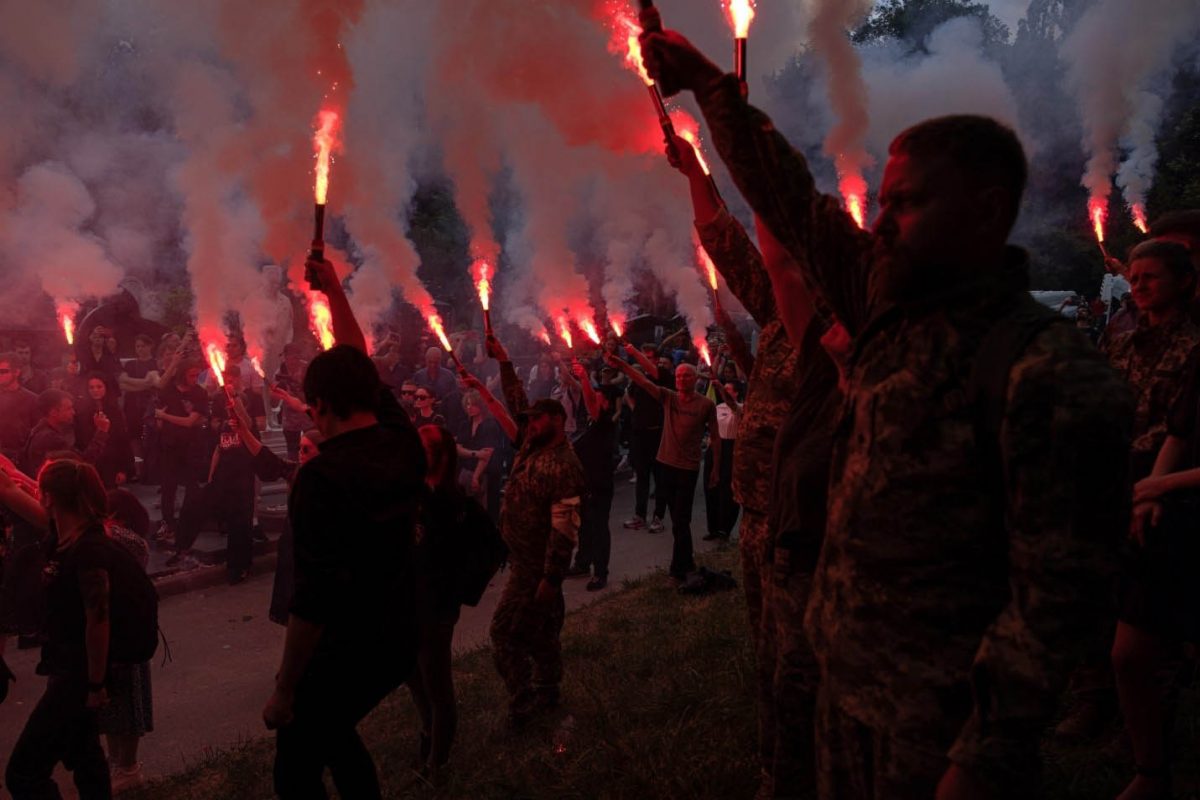KYIV, (Reuters) – Ukraine’s President Volodymyr Zelenskiy predicted Russia will escalate its attacks this week as European Union leaders consider whether to back Kyiv’s bid to join the bloc and Moscow presses its campaign to win control of the country’s east.
“Obviously, this week we should expect from Russia an intensification of its hostile activities,” Zelenskiy said in his Sunday nightly video address. “We are preparing. We are ready.”
Ukraine applied to join the EU four days after Russian troops poured across its border in February. The EU’s executive, the European Commission, on Friday recommended that Ukraine receive candidate status.
Leaders of the 27-nation union will consider the question at a summit on Thursday and Friday and are expected to endorse Ukraine’s application despite misgivings from some member states. The process could take many years to complete.
The EU’s embrace of Ukraine would interfere with one of Russian President Vladimir Putin’s stated goals when he ordered his troops into Ukraine: to keep Moscow’s southern neighbor outside of the West’s sphere of influence.
Putin on Friday said Moscow had “nothing against” Ukraine’s EU membership, but a Kremlin spokesperson said Russia was closely following Kyiv’s bid especially in light of increased defense cooperation among member countries.
On the battlefield, Russian forces are trying to take complete control of the eastern Donbas region, parts of which were already held by Russian-backed separatists before the Feb. 24 invasion.
A prime target of Moscow’s eastern assault is the industrial city of Sievierodonetsk. Russia said yesterday it had seized Metyolkine, a village on the outskirts, and Russian state news agency TASS reported that many Ukrainian fighters had surrendered there. Ukraine’s military said Russia had “partial success” in the area.
Luhansk Governor Serhiy Gaidai told Ukrainian TV that a Russian attack on Toshkivka, 35 km (20 miles) south of Sievierodonetsk, also “had a degree of success.”
In Sievierodonetsk itself, a city of 100,000 before the war, Gaidai said Russia controlled “the main part” but not the entire town after intense fighting. Reuters could not independently confirm the battlefield accounts.
Both Russia and Ukraine have continued heavy bombardment around Sievierodonetsk “with little change to the front line”, Britain’s Ministry of Defence said on Sunday.
In Sievierodonetsk’s twin city of Lysychansk, residential buildings and private houses had been destroyed by Russian shelling, Gaidai said. “People are dying on the streets and in bomb shelters,” he added.
He later said 19 people had been evacuated on Sunday. “We are managing to bring in humanitarian aid and evacuate people as best we can,” Gaidai said.
Analysts at the Institute for the Study of War, a Washington-based think tank, wrote in a note that “Russian forces will likely be able to seize Sievierodonetsk in the coming weeks, but at the cost of concentrating most of their available forces in this small area.”
NATO Secretary-General Jens Stoltenberg said the Ukraine conflict could last for years and urged Western governments to continue sending state-of-the-art weaponry to Ukrainian troops, Germany’s Bild am Sonntag newspaper reported.
“We must prepare for the fact that it could take years. We must not let up in supporting Ukraine,” Stoltenberg was quoted as saying.
Russia has said it launched what it calls a “special military operation” to disarm its neighbour and protect Russian speakers there from dangerous nationalists. Kyiv and its allies dismiss that as a baseless pretext for a war of aggression.
The British military assessment said morale for Ukrainian and Russian combat units in the Donbas was likely “variable.”
“Ukrainian forces have likely suffered desertions in recent weeks, however, Russian morale highly likely remains especially troubled. Cases of whole Russian units refusing orders and armed stand-offs between officers and their troops continue to occur,” the British Ministry of Defence said on Twitter.
In Ukraine’s second-largest city Kharkiv, northwest of Luhansk, Russia’s defence ministry said its Iskander missiles had destroyed weaponry recently supplied by Western countries.
Russian forces were trying to approach Kharkiv, which experienced intense shelling earlier in the war, and turn it into a “frontline city”, a Ukrainian interior ministry official said.
In southern Ukraine, Western weaponry had helped Ukrainian forces advance 10 km (6 miles) towards Russian-occupied Melitopol, its mayor said in a video posted on Telegram from outside the city.
An EU decision in favor of Kyiv’s ultimate membership would put Ukraine on track to realize an aspiration that would have been out of reach for the former Soviet republic before the Russian invasion.
“Whole generations fought for a chance to escape from the prison of the Soviet Union and, like a free bird, to fly to European civilisation,” the speaker of Ukraine’s parliament, Ruslan Stefanchuk, said in a statement.





